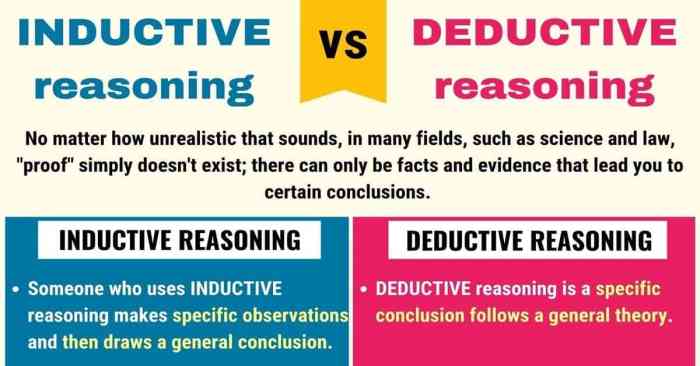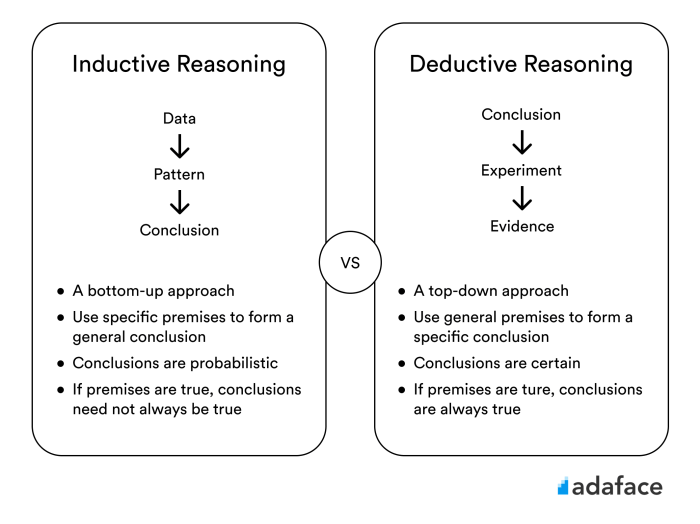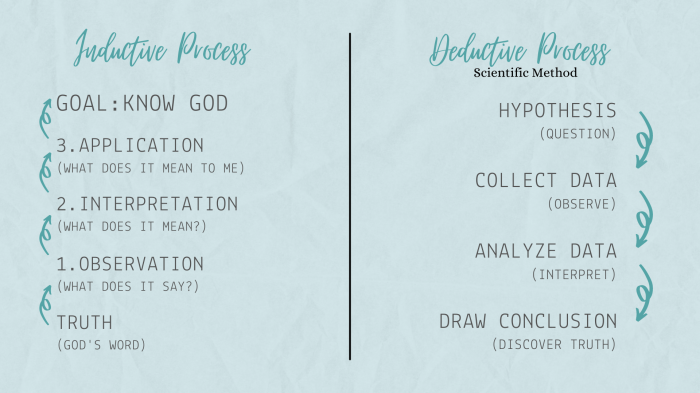Deductive vs inductive bible study – Embark on a journey of biblical exploration as we delve into the contrasting methodologies of deductive and inductive Bible study. This in-depth analysis unveils the intricacies of each approach, providing valuable insights into their strengths, limitations, and appropriate applications.
Deductive Bible study, akin to a top-down approach, begins with established principles or doctrines and seeks to extract specific meanings from biblical texts. Conversely, inductive Bible study, employing a bottom-up approach, meticulously examines biblical passages to uncover their underlying themes and truths.
Inductive Bible Study

Inductive Bible study is a method of studying the Bible that emphasizes observation, interpretation, and application. It begins with the text of the Bible itself and seeks to understand the meaning of the text through careful observation and analysis.
The inductive Bible study process typically involves the following steps:
- Observation:Reading the text carefully and noting what it says.
- Interpretation:Determining the meaning of the text based on its context and language.
- Application:Applying the meaning of the text to one’s own life.
Inductive Bible study can be used to study any part of the Bible. It is a valuable tool for understanding the Bible’s teachings and applying them to one’s own life.
Benefits of Inductive Bible Study, Deductive vs inductive bible study
- Inductive Bible study helps readers to understand the Bible for themselves.
- Inductive Bible study encourages readers to think critically about the Bible.
- Inductive Bible study helps readers to apply the Bible to their own lives.
Deductive Bible Study

Deductive Bible study is a method of studying the Bible that begins with a general principle or truth and then seeks to find evidence for that principle or truth in the text of the Bible. It is a top-down approach to Bible study that starts with a predetermined conclusion and then seeks to find support for that conclusion in the text.
The deductive Bible study process typically involves the following steps:
- Formulating a hypothesis:Stating a general principle or truth that you believe is taught in the Bible.
- Testing the hypothesis:Searching the text of the Bible for evidence to support your hypothesis.
- Drawing a conclusion:Based on the evidence you have found, either confirming or rejecting your hypothesis.
Deductive Bible study can be used to study any part of the Bible. It is a valuable tool for understanding the Bible’s teachings and applying them to one’s own life.
Benefits of Deductive Bible Study
- Deductive Bible study helps readers to understand the Bible’s overall message.
- Deductive Bible study encourages readers to think systematically about the Bible.
- Deductive Bible study helps readers to apply the Bible to their own lives.
Comparison of Inductive and Deductive Bible Study: Deductive Vs Inductive Bible Study

Inductive and deductive Bible study are two different methods of studying the Bible. Both methods have their own strengths and weaknesses. The following table compares the two methods:
| Inductive Bible Study | Deductive Bible Study |
|---|---|
| Starts with the text of the Bible | Starts with a general principle or truth |
| Focuses on observation, interpretation, and application | Focuses on testing a hypothesis |
| Encourages readers to think critically about the Bible | Encourages readers to think systematically about the Bible |
| Helps readers to understand the Bible for themselves | Helps readers to understand the Bible’s overall message |
The best method of Bible study for you will depend on your individual learning style and goals. If you are looking for a method that will help you to understand the Bible for yourself, then inductive Bible study may be a good option.
If you are looking for a method that will help you to understand the Bible’s overall message, then deductive Bible study may be a good option.
Application of Inductive and Deductive Bible Study
Inductive and deductive Bible study can be used together to create a comprehensive understanding of the Bible. For example, you could use inductive Bible study to study a particular passage of Scripture and then use deductive Bible study to see how that passage fits into the overall message of the Bible.
The following lesson plan incorporates both inductive and deductive Bible study:
- Inductive Bible study:Read the passage of Scripture carefully and note what it says. Interpret the meaning of the text based on its context and language. Apply the meaning of the text to your own life.
- Deductive Bible study:Formulate a hypothesis about the overall message of the Bible. Test your hypothesis by searching the text of the Bible for evidence to support it. Draw a conclusion based on the evidence you have found.
This lesson plan can be used to study any part of the Bible. It is a valuable tool for understanding the Bible’s teachings and applying them to one’s own life.
Questions and Answers
What is the primary distinction between deductive and inductive Bible study?
Deductive study derives conclusions from established principles, while inductive study derives principles from the examination of specific biblical passages.
When is it appropriate to employ deductive Bible study?
Deductive study is suitable for confirming doctrinal beliefs or addressing specific theological questions.
What are the advantages of inductive Bible study?
Inductive study promotes a deeper understanding of biblical context, fosters critical thinking skills, and enhances personal engagement with the text.